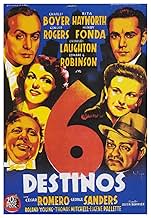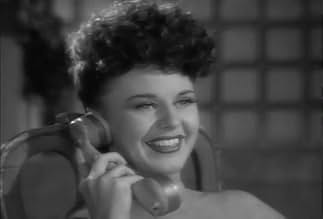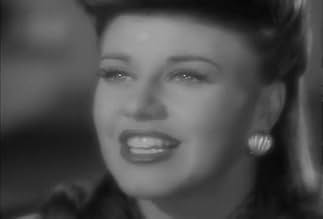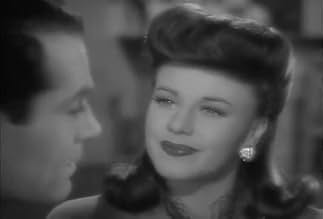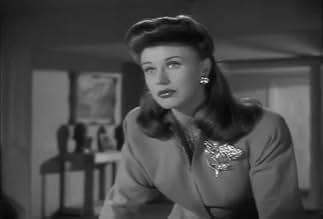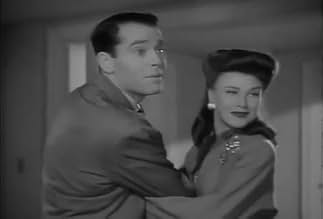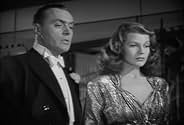IMDb RATING
7.3/10
2.7K
YOUR RATING
A formal tailcoat that gets passed from one owner to another affects each life in a significant way.A formal tailcoat that gets passed from one owner to another affects each life in a significant way.A formal tailcoat that gets passed from one owner to another affects each life in a significant way.
- Awards
- 7 wins total
Featured reviews
This movie is made up of many vignettes featuring many capable stars--all centering on the same second-hand tuxedo as it is passed on from one owner to the next. I won't try to elaborate on all the segments, as one of the previous reviewers did a very thorough job of describing them. However, they are all extremely well-crafted and engaging. I would also agree that stylistically, this film is reminiscent of IF I HAD A MILLION, though the stories in Tales of Manhattan are generally less funny but more polished.
The one portion of the movie that really stood out for me was the one featuring the down-and-out Edward G. Robinson attending his college class reunion (from Harvard, I think). He goes in a tattered old hand-me-down tux hoping to fool his old chums into thinking he's made it in life. You really feel for the guy in his plight--especially when a mean-spirited member of the class seeks to expose the ruse! So give it a try, why don't ya?
The one portion of the movie that really stood out for me was the one featuring the down-and-out Edward G. Robinson attending his college class reunion (from Harvard, I think). He goes in a tattered old hand-me-down tux hoping to fool his old chums into thinking he's made it in life. You really feel for the guy in his plight--especially when a mean-spirited member of the class seeks to expose the ruse! So give it a try, why don't ya?
This is one of the better multiple story movies from Hollywood, though it demonstrates the limitations of the genre as well as it's strengths. At it's best, this kind of movie manages to integrate the stories in some way (think of the plot of GRAND HOTEL or DINNER AT EIGHT, where the problems of different groups of characters manage to intertwine in a confined space - another example (though a non-Hollywood film) is the British horror classic DEAD OF NIGHT). Some of the anthology films based on the stories of a particular writer (O'Henry or Somerset Maugham for instance) don't have to blend the stories because of the style of the writer, which unifies the different stories. But then you have a well made film like this one, with a good journeyman director (Jules Duvivier, who had previously done the similar FLESH AND FANTASY), and an all name cast to die for. This is the only film that had Charles Boyer, Rita Hayworth, Thomas Mitchell, Roland Young, Eugene Pallette, Henry Fonda, Ginger Rogers, Cesar Romero, Charles Laughton, Elsa Lanchester, Victor Francken, Edward G. Robinson, James Gleason, George Sanders, W.C.Fields, Margaret Dumont, Phil Silvers, J. Carroll Naish, Paul Robeson, Ethel Waters, Eddie Anderson, and Clarence Muse in one picture - even though they were in different stories.
But the running thread is weak. It is the passing of a "monkey suit" back and forth from one leading character to another - a pun on "tales" and "tails" (which is what such an elaborate tuxedo is called). That the actors who get the "tails" (Boyer, Romero, Laughton, Robinson, Fields) do not fit the same size clothes does not seem to be taken into consideration. Interestingly, Laughton did lose weight for the role, but he still is burlier than Boyer or Romero. As for the final recipients of the "tails" (Naish and Robeson), the former is a crook who wears the suit briefly while pulling off the robbery of a casino, and then uses the suit as a container for the stolen cash, and the latter never cares about the coat, but is mostly concerned with the cash that is dropped down inside it. The "tails" end up being used on a scarecrow on Robeson's farm.
It is a silly device to use, and the ending (an all African-American episode about how a rural town of African - Americans finds the "tails" containing stolen cash (dropped from a plane by J. Carroll Naish). As the characters in the other stories were all whites in the upper classes (even the now impoverished Robinson was once a successful attorney, and Fields is a social climber/ fake lecturer on the dangers of drinking. The Blacks in the film are definitely in the lower classes. What is unique about their segment is that the money that Robeson finds is not kept (as he would have done) by him but split into shares for every Black person in the town - a "Marxist" kind of solution that fits with Robeson's political views in the late 1940s and early 1950s. Dramatically the two best stories are the ones about Robinson pretending that he is not an impoverished bum, when attending the reunion of his college classmates (one of whom, Sanders, is an old rival who suspects the truth), and the first story about the purchase of the cursed set of "tails" by Boyer, and his subsequent discovery of the unworthiness of his lover Hayworth (who is left humiliated with her husband Mitchell). The continental flavor of Boyer's sequence may be the portion of the film based on a script of Ferenc Molnar's. The Laughton sequence is okay, but nothing to rave about (although the role of Victor Francken as the tempermental symphony conductor - who helps Laughton - is a clone of "Toscanini", down to the name of the character - "ARTURO Belini". The weakest is the Fonda - Rogers - Romero sequence, which should have been better (and the fine screen attraction of Fonda and Rogers makes one wish that they made a complete film together - tragically this segment was their only film together). The Naish sequence is too brief to be judged well, though Naish does exude menace as a thief.
That leaves the famous "lost" sequence of Fields and Margaret Dumont. It really was never fully lost - for many years film societies showing "Fields" specialties would show that sequence like a short. But it is not complete as it survives. How did Margaret Dumont get her head stuck in the chandelier that she is wearing? That is not in the final sequence that the video version of the movie includes.
It was their second movie together. Fields own NEVER GIVE A SUCKER AN EVEN BREAK included his romancing Dumont (as the wealthy Mrs. Hemoglobin) despite the rivalry of Leon Erroll. That film was made in 1941, and perhaps Fields suggested reteaming with Dumont. She is a good foil for him, but nothing else (and nobody else) at the lecture is worthy of Fields' typical shafts of wit. The only other to stand out (at all) in the lecture portion of the sequence is Chester Clute, the alcoholic husband of Dumont, and he does not confront Fields.
But earlier in the sequence is a worthy adversary - in fact the only worthy adversary Fields ever had in a congame confrontation: Phil Silvers. As this was one of Fields last movies, it was one of Silvers first films. Television's future "Sergeant Bilko" had begun to perfect his style of flim-flam and fast talk, and it is a treat of sorts watching him con Fields into paying for the "tails" by putting a fake wad of bills in the coat (so Fields thinks he's getting the better of Silvers in the deal). A bit like watching the passing of a crown between champions of their days.
But the running thread is weak. It is the passing of a "monkey suit" back and forth from one leading character to another - a pun on "tales" and "tails" (which is what such an elaborate tuxedo is called). That the actors who get the "tails" (Boyer, Romero, Laughton, Robinson, Fields) do not fit the same size clothes does not seem to be taken into consideration. Interestingly, Laughton did lose weight for the role, but he still is burlier than Boyer or Romero. As for the final recipients of the "tails" (Naish and Robeson), the former is a crook who wears the suit briefly while pulling off the robbery of a casino, and then uses the suit as a container for the stolen cash, and the latter never cares about the coat, but is mostly concerned with the cash that is dropped down inside it. The "tails" end up being used on a scarecrow on Robeson's farm.
It is a silly device to use, and the ending (an all African-American episode about how a rural town of African - Americans finds the "tails" containing stolen cash (dropped from a plane by J. Carroll Naish). As the characters in the other stories were all whites in the upper classes (even the now impoverished Robinson was once a successful attorney, and Fields is a social climber/ fake lecturer on the dangers of drinking. The Blacks in the film are definitely in the lower classes. What is unique about their segment is that the money that Robeson finds is not kept (as he would have done) by him but split into shares for every Black person in the town - a "Marxist" kind of solution that fits with Robeson's political views in the late 1940s and early 1950s. Dramatically the two best stories are the ones about Robinson pretending that he is not an impoverished bum, when attending the reunion of his college classmates (one of whom, Sanders, is an old rival who suspects the truth), and the first story about the purchase of the cursed set of "tails" by Boyer, and his subsequent discovery of the unworthiness of his lover Hayworth (who is left humiliated with her husband Mitchell). The continental flavor of Boyer's sequence may be the portion of the film based on a script of Ferenc Molnar's. The Laughton sequence is okay, but nothing to rave about (although the role of Victor Francken as the tempermental symphony conductor - who helps Laughton - is a clone of "Toscanini", down to the name of the character - "ARTURO Belini". The weakest is the Fonda - Rogers - Romero sequence, which should have been better (and the fine screen attraction of Fonda and Rogers makes one wish that they made a complete film together - tragically this segment was their only film together). The Naish sequence is too brief to be judged well, though Naish does exude menace as a thief.
That leaves the famous "lost" sequence of Fields and Margaret Dumont. It really was never fully lost - for many years film societies showing "Fields" specialties would show that sequence like a short. But it is not complete as it survives. How did Margaret Dumont get her head stuck in the chandelier that she is wearing? That is not in the final sequence that the video version of the movie includes.
It was their second movie together. Fields own NEVER GIVE A SUCKER AN EVEN BREAK included his romancing Dumont (as the wealthy Mrs. Hemoglobin) despite the rivalry of Leon Erroll. That film was made in 1941, and perhaps Fields suggested reteaming with Dumont. She is a good foil for him, but nothing else (and nobody else) at the lecture is worthy of Fields' typical shafts of wit. The only other to stand out (at all) in the lecture portion of the sequence is Chester Clute, the alcoholic husband of Dumont, and he does not confront Fields.
But earlier in the sequence is a worthy adversary - in fact the only worthy adversary Fields ever had in a congame confrontation: Phil Silvers. As this was one of Fields last movies, it was one of Silvers first films. Television's future "Sergeant Bilko" had begun to perfect his style of flim-flam and fast talk, and it is a treat of sorts watching him con Fields into paying for the "tails" by putting a fake wad of bills in the coat (so Fields thinks he's getting the better of Silvers in the deal). A bit like watching the passing of a crown between champions of their days.
I've never seen this film in a TV listing that I can remember, which is amazing considering the magnitude of its cast. Probably the best segment is the opening one, with Rita Hayworth (at her most glamorous), Charles Boyer (who is a bit too dramatic), & the ever effective Thomas Mitchell. The Ginger Rogers/ Henry Fonda/ Cesar Romero segment is OK. The Charles Laughton/ Elsa Lanchester segment is pretty good. Although I'm a big WC Fields fan, this was not his best work, although it had a couple of very funny moments (I'm surprised that I've never seen clips from this film on any of the bios about him). The Edward G. Robinson/ George Sanders segment was a bit too intellectual, but well acted (& it was great seeing a young Robinson do scenes I've never seen before). The film ended strongly with an all-black segment featuring Paul Robeson/ Ethel Waters/ Rochester, with the great Clarence Muse in a small part. As an extra treat, this last segment contained a song by Robeson, but the sets for this segment were Broadway stage-like, & not realistic looking like the rest of the film (compare the painted back-drops here with the realism of the Robinson alleyway in an earlier segment). Even if you don't enjoy the story segments, anyone who likes great actors/actresses of the 1930s - 1940s must see this film. I rate it 8/10.
10lora64
This movie leads us through a wide range of emotional interests -- good, bad, and indifferent -- all based on the odyssey of a tuxedo coat (or 'tails') which also seems to carry with it a superstitious jinx of sorts. At the start the first tale runs the gamut of intense romantic intrigue, with a suave Charles Boyer drawn to beautiful Rita Hayworth, and Thomas Mitchell as the husband with a few ulterior motives of his own in mind. I think the cinematography by Joseph Walker is absolutely superb in this episode. Those closeups are priceless.
I was surprised to see the episode with W C Fields in it and checked IMDb to note that this was included in a restored version, which is nice. Fields and his "liquid edification" are seldom far apart, and here it appears in the guise of cocoanut milk, with a few additives as you can guess, which he highly recommends for (?) I forget what it was.
Another tale is of Edward G. Robinson who gives an excellent performance as the down-and-outer dressed in the tux for a special gathering of old school chums. It has fine emotional content which I consider the dramatic highlight of the film and gives one much to think about afterwards. I might add here that this movie brings to mind some of Somerset Maugham's short stories that are on film as well.
The final Manhattan tale, starring Paul Robeson and Eddie 'Rochester' Anderson, has dialogue that is both amusing and touching at times. Ethel Waters, the matronly Esther, shows them a firm hand in directing them to do what's right. I always like to see Paul Robeson and hear his great voice. His singing ends their episode on a note of what freedom means to so many, and really brings the film to a fine conclusion. Great stuff!
It is a fascinating movie to experience and one of the best of its kind in my opinion.
I was surprised to see the episode with W C Fields in it and checked IMDb to note that this was included in a restored version, which is nice. Fields and his "liquid edification" are seldom far apart, and here it appears in the guise of cocoanut milk, with a few additives as you can guess, which he highly recommends for (?) I forget what it was.
Another tale is of Edward G. Robinson who gives an excellent performance as the down-and-outer dressed in the tux for a special gathering of old school chums. It has fine emotional content which I consider the dramatic highlight of the film and gives one much to think about afterwards. I might add here that this movie brings to mind some of Somerset Maugham's short stories that are on film as well.
The final Manhattan tale, starring Paul Robeson and Eddie 'Rochester' Anderson, has dialogue that is both amusing and touching at times. Ethel Waters, the matronly Esther, shows them a firm hand in directing them to do what's right. I always like to see Paul Robeson and hear his great voice. His singing ends their episode on a note of what freedom means to so many, and really brings the film to a fine conclusion. Great stuff!
It is a fascinating movie to experience and one of the best of its kind in my opinion.
For a brief period in cinema history, the anthology film was all the rage. Movies like "Flesh and Fantasy" and "O. Henry's Full House" used large casts to tell several interlocked stories. "Tales of Manhattan" is the best of the anthology films, following the adventures of a tuxedo's tailcoat as it passes through the hands of several diverse people in New York. There's Charles Boyer, the Broadway actor who is carrying on an illicit affair; there's Henry Fonda who is helping Cesar Romero get out of a sticky situation with his fiancee Ginger Rogers (along the way, Fonda and Rogers fall in love and have one of the best-written love scenes to ever hit the screen); there's Charles Laughton who seeks one shot at glory conducting an orchestra; and, in the most touching and rewarding of the tales, there's Edward G. Robinson, a down-and-out bum who has been invited to his college reunion. If you're looking for an all-star cast and a first-rate cinema experience, "Tales of Manhattan" is the one. I consistently put this movie at the top of my all-time favorites.
Did you know
- TriviaW.C. Fields appeared in a chapter which was cut from the final theatrical version. It had been restored to the 1996 VHS version. Also in the segment are Margaret Dumont Marcel Dalio, and Phil Silvers. However, when it was later on released in DVD, the Fields segment was deleted again.
- GoofsEven though the audience has seen a close-up of Charles Boyer's bullet wound behind the left side of his jacket, when he turns to say goodbye to Mitchell and Hayworth the left side of the jacket lifts, and there is no bloodstain.
- Quotes
Paul Orman: What did you want to say about guns, Mr. Halloway?
John Halloway: Ever use 'em?
Paul Orman: Yes, on the stage.
Paul Orman: Shoot 'em?
John Halloway: On the stage.
John Halloway: Not real bullets?
Paul Orman: No.
John Halloway: Just blanks, eh?
Paul Orman: Yes, only blanks. We actors prefer them.
- Crazy creditsThe following contains a restored sequence starring W.C. Fields which was not included in the original theatrical release of "Tales of Manhattan."
- Alternate versionsSome scenes featuring W.C. Fields were filmed but cut from the movie before release. The US video version restores this unseen footage. In this 9 minute sequence, Phil Silvers and Marcel Dalio played the Santelli Brothers who owned the used clothing store where Fields bought the dinner jacket. Margaret Dumont played a wealthy woman who hired Fields to give a lecture on the evils of alcohol. The J. Carroll Naish episode was filmed and substituted for the longer Fields episode after it was cut.
- ConnectionsFeatured in M.A.S.H.: Morale Victory (1980)
- SoundtracksPerpetual Motion (Perpetuum mobile, Op. 257)
(uncredited)
Music by Johann Strauss
Played at the concert hall rehearsal
- How long is Tales of Manhattan?Powered by Alexa
Details
- Release date
- Country of origin
- Official sites
- Language
- Also known as
- Tales of Manhattan
- Filming locations
- Production company
- See more company credits at IMDbPro
Box office
- Budget
- $1,000,000 (estimated)
- Runtime1 hour 58 minutes
- Color
- Aspect ratio
- 1.37 : 1
Contribute to this page
Suggest an edit or add missing content


